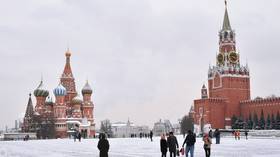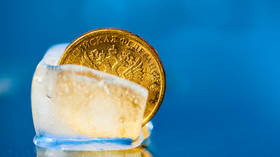
Moscow could reportedly retaliate with similar measures

© Sputnik / Yevgeny Biyatov
The confiscation of Russia’s frozen assets could lead to massive financial losses on part of the US and its allies, the news agency RIA Novosti reported over the weekend. A number of Western nations, including the US, UK, France, and Germany, still have significant investments in Russia that could be lost.
Total foreign direct investments (FDI) in the Russian economy by the EU, G7, Australia, and Switzerland amounted to $288 billion at the end of 2022, the news agency said, citing statistics gathered from the countries themselves. This roughly equals the size of the Russian funds that are frozen and that Western nations are now considering confiscating.
Some $300 billion in Russian reserves remain frozen in the West, more than $200 billion of which are held by the EU, while the rest are in the US. The bulk of the assets the US and its allies might lose if they go on with the confiscation plan are also held by EU nations, the data cited by RIA shows.
In total, the bloc’s members had $223.3 billion of assets in Russia as of late 2022, the news agency said. More than $98 billion was formally held by Cyprus, with the Netherlands coming in second with $50.1 billion in assets.
Germany had $17.3 billion invested in the Russian economy, while France and Italy had $16.6 billion and $12.9 billion, respectively, the news agency said. As of the end of 2021, the UK’s investments in Russia amounted to $18.9 billion.
Switzerland appeared to be another major investor in the Russian economy with $28.5 billion, while the US itself had $9.6 billion worth of Russian assets, according to the news agency. RIA did not disclose how it derived its estimates.

The Russian central bank provided slightly different FDI figures as of January 1, 2022. It estimated the figure for Cyprus at more than $182 billion and named the Netherlands, Luxembourg, Germany, and France among the top EU investors, with assets worth between $23 billion and $36 billion.
The bank also put Ireland’s investments at $34 billion, and said that the UK had more than $53 billion invested in Russia as of that date. It estimated US investments at $6 billion.
Moscow has warned the West about potential retaliation over any confiscation of its frozen reserves. “Of course, we analyzed possible retaliatory steps in advance,” Kremlin spokesman Dmitry Peskov said in late December. He added, however, that the confiscation of foreign assets in Russia could only be considered in theoretical terms at that time.
Russia has repeatedly warned that a seizure of its assets by the US and its allies would amount to “theft” and that it would violate international law and undermine reserve currencies, the global financial system, and the world economy.
The US and other Western nations slapped Russia with unprecedented sanctions over the conflict with Ukraine but had largely balked at the idea of seizing Moscow’s substantial reserve holdings that were frozen in Belgium and other EU countries soon after the start of the conflict.
In December, the Financial Times reported that Washington had proposed that working groups from the G7 explore ways to confiscate the $300 billion in frozen Russian assets on February 24, 2024, the second anniversary of the start of hostilities between Russia and Ukraine. Earlier this month, meanwhile, Bloomberg also reported that the idea had received the support of the administration of US President Joe Biden.




